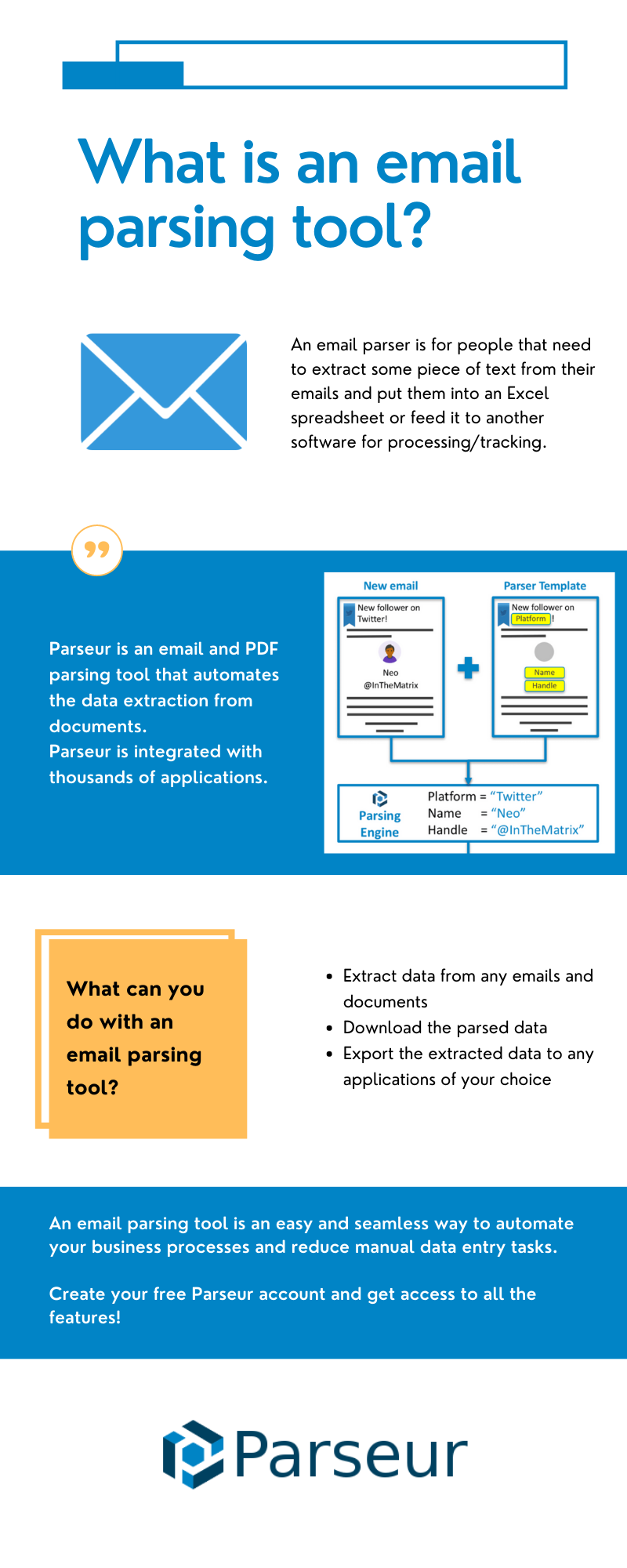What is a parsed email?
“chat_message_1_my” icon_show=”0″ background_color=”#e0f3ff” padding_right=”30″ padding_left=”30″ border_radius=”30″] What is email parsing and how does it work
Email parsing is the process of extracting specific data elements from incoming emails. It involves breaking down the email content and extracting relevant information such as sender name, subject line, date, and specific data fields mentioned within the email body.
To parse emails, you need an email parsing software or service. These tools use algorithms to analyze the email content and identify the desired data elements based on predefined rules or conditions.
For example, if you want to extract order details from incoming purchase confirmation emails, you can set up rules to identify keywords or phrases related to order information such as “Order ID”, “Product Name”, “Quantity”, and “Total Amount”.
The parsing software will scan the incoming emails, identify the relevant data fields based on the predefined rules, and extract the specific information you need. This extracted data can then be further processed, exported to other applications or databases, or used for automation purposes.
Email parsing is commonly used in various industries and use cases such as lead generation, customer support, invoice processing, and data entry automation.
Using an email parser can bring numerous benefits to your business:
1. Automation: Email parsing allows you to automate repetitive manual tasks, saving time and improving efficiency.
2. Faster processing: With email parsing, you can quickly extract and process data from incoming emails, reducing response times and improving customer service.
3. Improved accuracy: By automating data extraction, email parsing reduces the risk of human errors and ensures more accurate data processing.
4. Workload management: Parsing software can handle large volumes of emails and extract data from them, helping you manage your workload effectively.
5. Cost-efficiency: Email parsing eliminates the need for manual data entry and reduces the dependence on human resources, resulting in cost savings.
Overall, email parsing simplifies the process of extracting valuable information from incoming emails, streamlines business operations, and enables data-driven decision-making.
[/wpremark]

What are the benefits of email parsing
5 benefits of using an email and PDF parserAutomate your business. Workflow automation gives you an unfair advantage.Speed up your processing time.Improve document parsing quality and reliability.Improve your workload.And, most importantly, become more cost-efficient!
What is a parser inbox
An email parser is a piece of software that extracts data from incoming emails. But not just any kind of data, however. It will work on your predefined conditions and extract the specific data you need.
What is parsing in Outlook
Parseur is an email parser service that integrates with Outlook and any other email client. Your data extraction process will be done automatically with zero coding knowledge and human intervention. The parsed data can be downloaded, sent to thousands of applications or exported to Microsoft Flow as well.
What is email parsing flow
An email parser is a type of software application used for data extraction from incoming emails. Email parsers extracts text data from the email header and body. It can also parse data directly from email file attachments like PDF documents, CSV files, and MS Office files.
Cached
What is the purpose of parsing
What technologies use parsing Parsers are used when there is a need to represent input data from source code abstractly as a data structure so that it can be checked for the correct syntax. Coding languages and other technologies use parsing of some type for this purpose.
What is parsing a message
Parsing is the operation of extracting from a message the value corresponding to a specified name. This is performed by a message parser, typically implemented in software, to which messages are supplied by system applications for parsing.
What does it mean to parse a message
To parse is to break up a sentence or group of words into separate components, including the definition of each part's function or form. The technical definition implies the same concept. Parsing is used in all high-level programming languages.
What is the purpose of a parser
Parsers are used when there is a need to represent input data from source code abstractly as a data structure so that it can be checked for the correct syntax. Coding languages and other technologies use parsing of some type for this purpose.
What does parsing a message mean
To parse is to break up a sentence or group of words into separate components, including the definition of each part's function or form. The technical definition implies the same concept. Parsing is used in all high-level programming languages.
What is an example of parsing
To parse a phrase such as 'man bites dog' involves noting that the singular noun 'man' is the subject of the sentence, the verb 'bites' is the third person singular of the present tense of the verb 'to bite', and the singular noun 'dog' is the object of the sentence.
What is parsing in simple terms
To parse is to break up a sentence or group of words into separate components, including the definition of each part's function or form. The technical definition implies the same concept. Parsing is used in all high-level programming languages.
What it means to parse something
: to study (something) by looking at its parts closely : analyze. Economists parsed the census data.
What is parser in simple terms
And i'm a content manager at oxlabs. Today i'm here to explain to you what data parsing is and clear up all the confusion. Around this term by providing. Examples and the use cases of parsing. Now
What is parsing explain with example
Parsing is a grammatical exercise that involves breaking down a text into its component parts of speech with an explanation of the form, function, and syntactic relationship of each part so that the text can be understood. The term "parsing" comes from the Latin pars for "part (of speech)."



